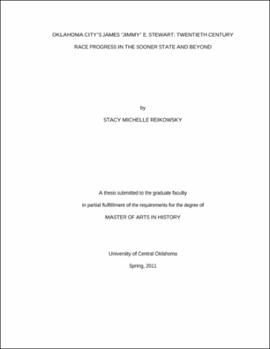| dc.description.abstract | James 'Jimmy' E. Stewart developed his abilities to influence people and applied diplomatic skills to create the social, cultural, and political networks that, over time, improved the lives of black Americans in Oklahoma and the nation. Recognizing the need for basic human equality, Stewart committed his efforts and struggled for black civil rights throughout the twentieth century. He also understood that the connections to more prominent and influential individuals were vital to his mission and believed in the people and associations who held the power to generate change. Stewart originally founded his progressive ideas in Oklahoma; where after, he gained national attention with multiple achievements. His contacts with well-known citizens spanned an array of important leaders in the military, schools, and job markets. Stewart's associations with those having social and political clout helped him quickly step into a leadership role, thereby positioning him as a valuable figure who unpretentiously established new, far-reaching, and long-lasting institutions for black Americans. An examination of Stewart's life not only establishes his contributions to the social, economic, and educational advancements of black Oklahomans, but also adds to an overall understanding of civil struggles compared to developments in other states. Race progress in surrounding states reflected numerous points of contention with unrelenting courtroom battles, disorderly and violent protest, and even public displays of punishment and exercise of power. Although Oklahoma was not without examples of lynching and riots during the twentieth century, the state's part in civil rights history developed with far less militant demonstrations. Stewart carefully pushed an optimistic black agenda in areas that staunchly excluded black involvement and scored victories for Oklahomans. Stewart did so in such a socially and politically sensitive way that more publicly bold events overshadowed his early work for civil justice and race equality. By examining his archival collection of personal letters, documents, and activities, Stewart's contributions to achieving equal right become clear. Furthermore, both black and white-oriented newspapers also help outline his place in race history. Stewart lived during a time of risk where black activism was not always popular and often problematic. Still, he resolutely coupled his inner strength with powerful ideals and developed a markedly effective approach to fighting for black justice and race progress. Because of his ability to balance his skills, connections, and leadership options, Stewart achieved success for blacks within specific fundamental social, cultural, political, and economic sectors throughout America during a racially tumultuous twentieth century; all the while promoting a personal brand of non-militant civil and human rights advancement. | |
